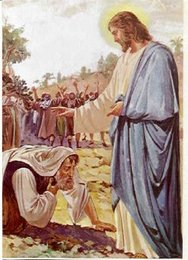
13th Sunday after Pentecost
Gratitude
Today the Gospel speaks to us of the famous ten lepers, all of whom Jesus healed of leprosy. Only one returned to render him thanks. And Jesus seems a little hurt that the other nine did not take the trouble to thank him.
We often say, “I’m only human … I just want a little thanks.” Jesus Christ is not only human, but he is human: “For we do not have a high priest who cannot sympathize with our weaknesses, but One who has been tempted in all things as we are, yet without sin” (Heb 4:15). One of our greatest weaknesses is ingratitude. We often do not take the trouble to thank God and God’s servants, and of course if we feel others do not thank us our noses go way out of joint. I can remember my first month as pastor of my last parish. The business manager took me aside one afternoon and said: “Father, I know you appreciate us, but you could tell us once in a while.” And I have been tempted to think many times, “all I do for this parish, and nobody appreciates it!”
So Jesus feels slighted, and rightly so. In fact, we owe God an infinite debt of gratitude for His infinite gifts, both for creating us and for redeeming us. He asks us to thank Him, surely not for his own good (he doesn’t “need our thanks”) but for our own good. It is good for us to cultivate and express genuine gratitude. Not the superficial “thank you” phrase so often parroted in our culture, but a welling up from the heart gratitude for His very presence.
Faith
How best to thank God? What gift can we give to the one who has everything? Well, what Jesus seems to want most of all is our faith. The lone leper, a Samaritan, a “double leper”, so to speak, renders him thanks: ‘gratias agens.” But how did he render thanks? He fell on his face at the feet of Jesus and magnified God in a loud voice: “cecidit in faciem, cum voce magna magnifcans Deum.” He professed his faith in the divinity of Christ. He believed in him. He prostrated himself before Jesus, which is done only before a deity. And Jesus makes this clear in the last line of our Gospel: “Rise and go: your faith has saved you.” Of course, what he means is that God has saved him, through his faith. But he first had to make that profession of faith in the Divine Person of Jesus.
It is precisely this faith that is seriously on the wane in our time. Without faith, nothing works. Without faith, there is no real love, no gratitude, no justice, no equality, no hope. All virtue, all prosperity and human flourishing, depend on one foundation: that there is a power greater than ourselves ordering the universe. Acknowledgement of God’s providence in human history changes everything for the individual Christian. Faith in God, not in man, served as foundation for the great flourishing of culture in the Christian west. This culture stands on the precipice in our time, as the faith on which it was built recedes.
Thus has Pope Benedict called for a Year of Faith. Let me read to you from the document Porta Fidei.
Whereas in the past it was possible to recognize a unitary cultural matrix, broadly accepted in its appeal to the content of the faith and the values inspired by it, today this no longer seems to be the case in large swathes of society, because of a profound crisis of faith that has affected many people…. In the light of all this, I have decided to announce a Year of Faith. It will begin on 11 October 2012, the fiftieth anniversary of the opening of the Second Vatican Council, … The starting date … also marks the twentieth anniversary of the publication of the Catechism of the Catholic Church.
We all have a crucial part to play in this Year of Faith. You who are tutors, must bring the faith to your students. All scholarship has its beginning and also its proper end in faith, “fides quarens intellectum” presupposes a faith, but also leads to our final end, union with God through faith. The Catechism begins with the Creed, but ends with Prayer, the deepest expression of faith. You who are students, must bring the faith to the world beyond this campus. TAC has set out to form witnesses to the Truth, “co-workers in the truth” in the words of Pope Benedict. Faith in God is the highest expression of Truth.
We count on Our Lady to help us, the woman who believed in the promises of God. In the concluding words of Benedict’s letter, “Let us entrust this time of grace to the Mother of God, proclaimed “blessed because she believed” (Lk 1:45).”


 RSS Feed
RSS Feed